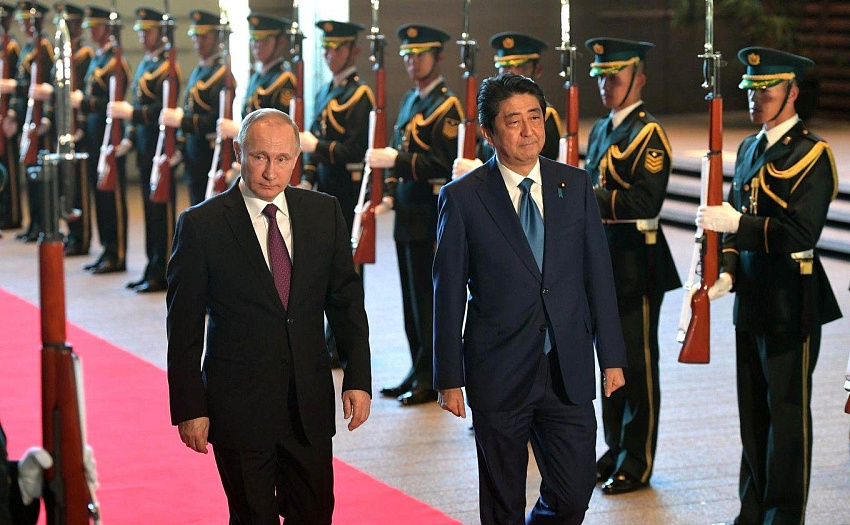Москва сделала геостратегический выбор поддерживать Минск.
Jun Isomura: Japan and Russia coming together

As staff to the late Shintaro Abe, former minister of foreign affairs and former secretary general of the Liberal Democratic Party, in 1990 Isomura arranged a meeting between the Soviet President Mikhail Gorbachev and Shintaro Abe. Isomura had a private meeting with Soviet Vice President Gennady Yanayev in the Kremlin just three days before the August 1991 coup.
- Mr. Isomura, thank you for agreeing to give an interview to our site. In the near future, Japanese Prime Minister Shinzo Abe is expected to visit Russia. What are your expectations from this visit?
- Prime Minister Abe met with President Vladimir Putin on 27th April at the Kremlin in Moscow. It was their 17th meeting. The last meeting was last December in Japan.
The meeting this time was for following up development of several projects what were agreed between two last December at President Putin visited to Japan. And more importantly, it was an opportunity to talk about the North Korean and the Syria issues, what will support even Russia-U.S. relations.
- In your opinion, is there any hope that the relations between Japan and Russia will be brought to a better level?
- Getting far better today. For long time, Moscow looked at only the west, and Japan looked at the east. Today, they turn faces each other.
There was huge development in Vladivostok for the APEC Summit 2012, and there has been the Easter Economic Forum every year there. However, development of Far East Russia is still so pure today.
Prime Minister Abe proposed a cooperation plan with eight points for focus on especially developing the Russian Far East to President Putin in May 2016. Both leaders confirmed that those plans are successfully developing at their meeting on 27th April.
I believe there will be wide capacity for cooperation between two countries to development not only Far East of Russia, but coastal area of the Sea of Japan and the whole Northeast Asia, including Mongolia, Northeast China, and North Korea in the future.
- As is known, historically relations between Russia and Japan did not develop very well. Is today's Japan aligned with the rapprochement of positions with Russia on the Kuril issue?
- The most important issue between two countries is to conclude a Peace Treaty. It was confirmed again at the summit meeting between President Putin and Prime Minister Abe on 27th April.
The Kuril issue was a issues created 61 years ago by somebody, and both couldn’t escape from the spellbinding of the devil.
1956, the Soviet-Japanese Joint Declaration was signed for the end of the state war, and for restoration of diplomatic relations between USSR and Japan. In the declaration, both agreed also to transfer two islands of the Kuril, Habomai Islands and Shikotan to Japan after concluding the Peace Treaty.
It will be a question forever why they couldn’t reach to conclude the Peace Treaty for more than 60 years between Soviet/Russia and Japan. If there was not even the devil, the Peace Treaty might be concluded in 1956 instead of the declaration. But it was just a period of the beginning of the Cold War between U.S. and Soviet Union. The Kuril Issue might be used a sort of a bulwark against Soviet.
- Japan is the only country bordering with Russia, with which it has not resolved the issue of the border line. Can a border conflict develop into a large-scale war?
- No, nothing at all. Both have the grand wisdom for keeping the good neighborhood.The Soviet-Japanese relations changed dramatically in 15th January 1990. Mr. Shintaro Abe (1924-1991), father of Prime Minister Shinzo Abe, and former Foreign Minister and former Secretary General of Liberal Democratic Party – the Ruling Party of Japan, held a meeting with Mr. Mikhail Gorbachev, General Secretary of the CCCP, at the Staraya Square in Moscow. The Kuril issue had been always a hindrance for an amicable meeting between Soviet and Japan for last decades. As a Japanese leading politician, Shintaro Abe had to mention about the Kuril issue. However, he knew well with his experience as Foreign Minister that the meeting would be broken, once he would raise the issue.
Mr. Abe proposed to Mr. Gorbachev to “let’s solve the headache and very difficult problem between us with our grand wisdom”. Mr. Abe never used the word of “the Kuril” what Soviet side wouldn’t listen. Mr. Gorbachev and all Soviet side well accepted and welcomed Mr. Abe’s highly considered and professional approach.
Since the meeting, the word of “мудрости“ (Grand Wisdom) has became the keyword between two countries, and discussions at any level between Soviet/Russia and Japan became relax, even a discussion of agree to disagree.
- As you know, Trump called Japan "a great ally." Is it true? In your opinion, how will develop the relations between Japan and the USA under Trump? What are your expectations of US-Japanese relations?
- Yes, it is true. Japanese Prime Minister Shinzo Abe held a summit meeting with President Donald Trump at the White House on 11th February 2017. It was outstandingly successful meeting for understanding each other and confirming the firm relations between two countries, and they also developed their trusted personal relationships.
Especially, President Trump invited Prime Minister Abe and his wife to the Air Force One, the President’s airplane, for flying to Florida. Next day, Mr. Trump and Mr. Abe spent all day for exchanging their views on bilateral issues and on the political situation of the world including North Korea, during playing golf and having dinner together. Since then, they keep telephone conversations frequently.
The U.S. and Japan should share responsibility and burden for keeping peace, stability, and sustainable development of the West Pacific and East Asia region. I expect both counties to cooperate for supporting ASEAN, and both work together for developing Northeast Asia zone, including Russian Far East, Mongolia, Korean Peninsula, and Northeast region of China.
The U.S.-Japan are also preparing a standard of an international trade rule which will be open, free, and fare.
- Washington supports Japan's efforts to resolve the territorial dispute with China over the islands in the South China Sea. But at the same time, the US is trying to improve relations with China (the Chinese leader recently visited the US). Who do you think is really supported by the Americans - Japan or China?
- There is, basically, the Security Treaty between the U.S. and Japan since 1951. President Trump confirmed to Prime Minister Abe that the Senkaku Islands, the islands in the East China Sea, are coverage of the U.S.-Japan Security Treaty.
The U.S. five Forces as Army, Navy, Air Force, Marine Corps, and Coast Guard station in Japan with 50,000 U.S. military personnel, 40,000 dependents of military personnel and another 5,500 American civilian employed at more than 60 U,S, military bases and facilities in Japan, including two islands for bombing and shooting ranges at the Senkaku Islands.
With the U.S.-Japan Security Treaty, the U.S. has an obligation for defend Japan. Therefore, the U.S. has no choice of China on security.
The stationing U.S. Forces in Japan are not only for defense of Japan, but they are strategic forces covering the Far East and the West Pacific regions.
- There are many differences between China and Japan, in particular territorial conflicts. Historically, these countries have always fought each other. Do you think the war between these countries is possible?
- Hope not, and I don’t thinks so. Because of, China and Japan both obtain common profit from their good, stable, and peaceful relations today. In more than two thousand years history between China and Japan, a period of peace was much longer than a conflict one.
However, there were the First Sino-Japanese were in 1894, and the Second Sino-Japanese War started at 1937 and continued for 8 years what damaged seriously the relations between China and Japan.
Both should keep control of tensions with the territorial and other conflicts. Generally and historically, it is necessity strong faith and political leadership for keeping peace with neighboring countries at both sides, since relations with a neighboring country are often a hotbed of conflict.


